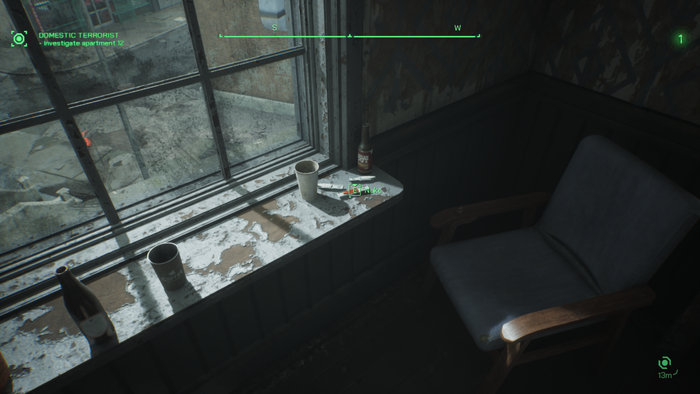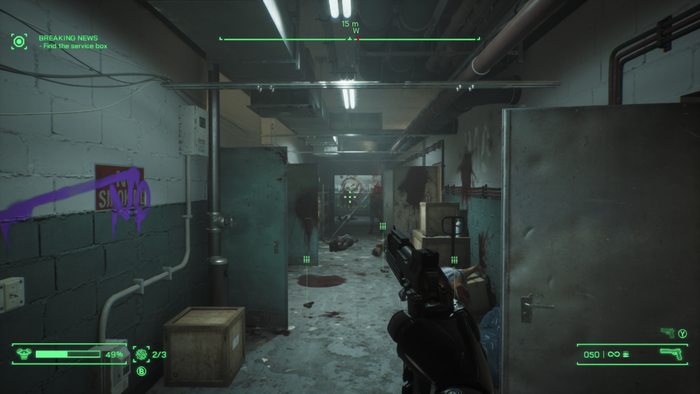Trending
Opinion: How will Project 2025 impact game developers?
The Heritage Foundation's manifesto for the possible next administration could do great harm to many, including large portions of the game development community.
The problem of experience points in cinematic gaming narratives.
January 30, 2024

Beginning with a siege in a tv broadcast centre filled to the brim with homegrown Chicago street gangs, the opening moments of Robocop: Rogue City make quite the first impression. Th first 10 minutes or so have the player waltzing into a heavily occupied foyer through a hail of terrorist gunfire in a tank shaped like a human. Taking control of Robocop is everything that it should be. Robocop is sturdy, and seemingly invulnerable to the small calibre fire plinking off his chrome-plated chassis. He paces steadily forward, his footsteps heavy and foreboding in my headphones. In my hands his semi-automatic pistol rains death upon my enemies. Overkill is the name of the game as each body is riddled with more lead than could ever be necessary to topple a lightly armed street thug. A glorious introduction to the game that demonstrates the raw cyborg power of our hero and probably one of the greatest moments in 2023 gaming.
There is a wonderful cinematic flow to much of Rogue City. Whether its in the confined basements of a crack den being hounded by drug dealers, or in the sprawling industrial yard being chased by knockoff Hell Angels. Or even the arcade-like shooting galleries, that totals kills as the player competes with local Swat units and hulking great big mechs. These moments push the player forward with a sense of urgency. And it is in these sections where the game is naturally pushing you forwards that the game excels. Robocop is the avatar of a steady relentless march of progress, a corporate tool used to enforce the law and dispense justice to the non-compliant.
What I wasn’t expecting from this initial setup, was to then spend the next 10 or so hours of the game rooting around in store cupboards for trinkets. Trinkets that net the player 25-100xp a pop that can then be used to add a 2 foot long spike to your fists. With the introduction of these hidden cache of experience points the cinematic flow suddenly shifts away from that forward narrative push. There is an incentive now to slow down and look in every nook and bolt hole searching for the smallest morsel of experience. Morsels that barely contribute to the push towards the next level up. The knowledge that there might be an extra incidental shot of XP just round the corner fundamentally changes the way the player looks around a room. Eyelines shift downwards, not searching for enemies, but for loot. Scanner locked in, searching for the slightest hint of that neon lime green that Rogue City highlights it's interactables with. These hidden caches of XP add very little to the experience but instead take away twice as much. Other than encouraging a min-maxer like myself to force our chromium killing machine to reach under washing machines, what does this serve the player but an increased chance of leveling up at an undisclosed point in the future? Despite the initial promises of an all out action romp, Rogue City, is a secret RPG. A fact that both benefits and hinders the design of the game.

Quite unexpectedly, Robocop: Rogue City is an RPG hidden behind the facade of an arcade-like shooter. Like the 2024 Mean Girls, Wonka or even Johnny Depps’s Sweeny Todd, that buried the lead and hid the fact they where musicals, the rpg elements of Rogue City are not necessarily put at the forefront of its design. In this Game Developer article reflecting on the design choices of the studio behind Rogue City they mention the decision behind the RPG elements was to enhance the ‘fragile humanity’ of our lead character. Bringing in choice does give us an insight into our lead character (Alex Murphy), and expands his narrative in a way that would not be possible with a straight shooter. Indeed, many of the decisions we have to make are heartbreaking. We can align Murphy to see themselves as a heartless machine, or a victim haunted by their past. In a touching moment Murphy’s therapist asks him how his feelings of trauma manifest themselves. Two options, ‘As echoes of the past’ or ‘As system failure’ represent the duality that Murphy faces, and as an element of roleplaying, this sort of choice can only happen naturally with RPGs.
In smashing together genres, as designers we often take systems wholesale rather than picking and choosing the elements that fit with the product. XP is perhaps one of those elements that could have been removed from Rogue City whilst still maintaining the progression and character development that is so common within the RPG genre. If RPGs are focused on roleplaying, than the incentive should be to play the role of the character. In Rogue City we are given a choice of how we evolve the personality of our version of Alex Murphy, just as Mass Effect allows us to cultivate a unique Shepherd, Disco Elysium gives us (conflicting) control over the mental state of the Detective. In these games it works quite naturally, the building of character is central to the choices that are made. The incentive to search for hidden XP in Rouge City is counter to the natural narrative flow of the Rogue City, and this isn’t a problem exclusive to Robocop. The 2011 game Deus Ex: Human Revolution awards the player for almost every action they make. The canny XP hungry player will make one run through each environment systematically ghosting the enemy, knocking them out and clearing the space, and then a second run through finding the secret crawl spaces, as exploration is also awarded for finding hidden routes. But a similar problem arises, in that when you are embarking on a time sensitive hostage rescue, these incidental punches of XP remove that urgency.
Perhaps this problem is a small one to be critiquing. Scrambling for micro doses of XP to be able to max out their character is not what the average player is going to experience. But for many, the knowledge that it is there is enough to cause a stutter in the gameplay experience. it poses an interesting design question, how could Rogue City have designed its experience system in a way that rewarded its players for going with the flow of action? Or more importantly, fitting the characterisation of its protagonist?

Much of the XP gained in the Rogue City is indeed gathered through storytelling via quest rewards, and its most effective method, through end of mission police evaluations. These evaluations are undertaken at the end of each level of the game, and reflect on the speed of completions, and other related metrics, and because of this level-ups often occur naturally in these moments after completing the assignment that Robocop was ordered to perform. To use a term taken from Dungeons and Dragons, I would call this Milestone Levelling. Milestone Levelling rewards the progression of the player based on their contribution to the forward motion of the story, and performing actions that are true to the roleplaying of the character. Efficiency in completing a level within the game sits well with the motion of the cinematic narrative of the game. Saving hostages (one metric you are marked on at the end of a level) is in character for a man of the law like Alex Murphy. Whereas the use of collectibles, perhaps isn’t as effective. It rewards players for exploration, but not for playing the character, and Robocop isn’t a character who would waste time looking behind crates for stolen handbags.
To look at Robocop's XP system is to see both a problem and a solution in one package. On the one-hand, the end of level evaluation, complete with letter grading, lends itself thematically to the overall narrative, and indeed complements the RPG like character growth that proceeds it. Whereas rewarding players for searching the environment outside of crime scenes feels like needless busy work. Perhaps a holdover from the smashing of the two genres of shooter and RPG.
Jon is a maker, lecturer and writer living in London, UK. He writes about interesting things like visual narrative design in video games and comics and slightly dryer topics like art and design history. Check out more of his writing on his blog.
Read more about:
BlogsYou May Also Like